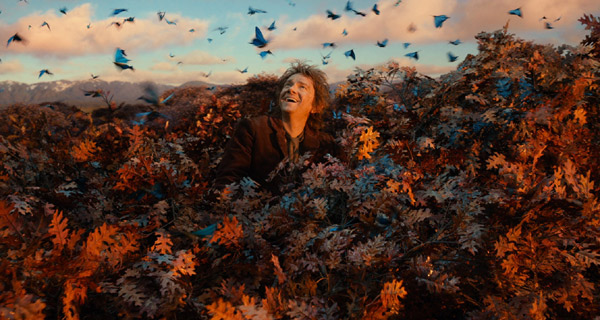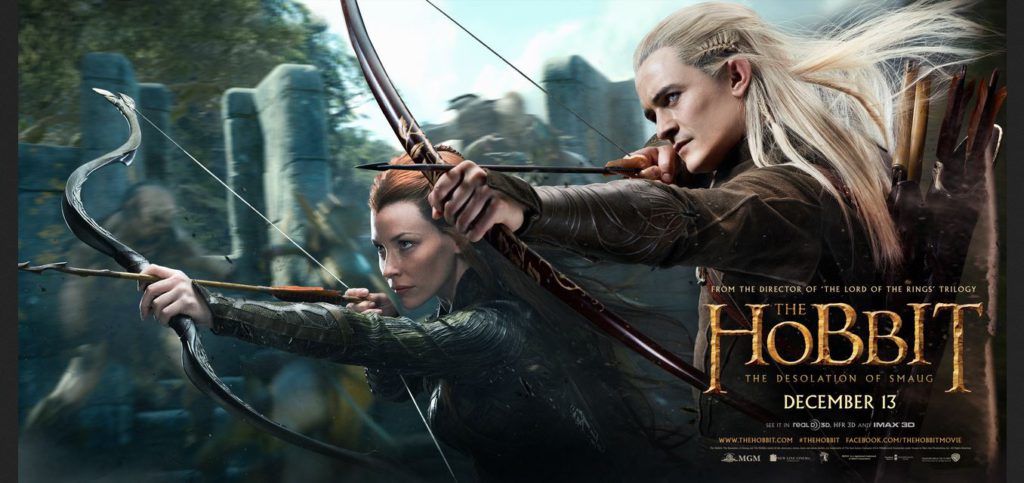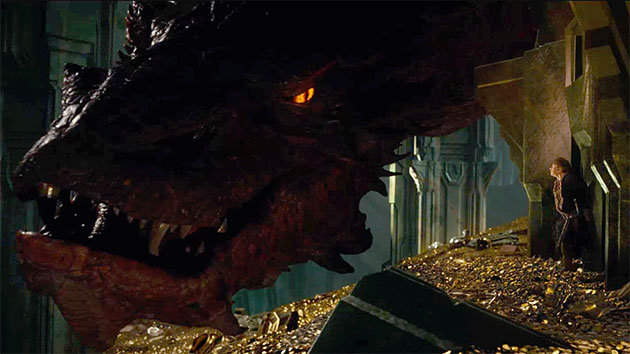Posted by Clark Kent Without Glasses in Movies, Review | 0 Comments
The Desolation Of Smaug [review]
I’m a huge Tolkien fan who has read The Hobbit many times, listened to the BBC radio drama more than I can remember and even read John D. Rateliff’s two-volume History of the Hobbit, a very detailed recounting of how the story came to be, including the original draft where Thorin was still called Gandalf. So obviously there was one film this year that I was really, really, really looking forward to and it has finally been released! The Hobbit: The Desolation of Smaug is the second part of the trilogy and this is my review of it!
You can read my thoughts on the first part in my earlier review of An Unexpected Journey, but to recap, I thought the first film was brilliant and an awesome Christmas present for this Tolkien fan. But to my amazement, The Desolation of Smaug manages to be even better.
 (4.5 / 5)
(4.5 / 5)
Other reviewers have pointed out that the tone darkens in this second chapter, but I would qualify that. Yes, this middle part is more serious but in no way is it any less fun. There is still quite a bit of humour and swashbuckling adventure in this chapter, even while some of the character arcs start moving in a grim direction.
Bilbo has grown more confident and starts to embrace his role in the group but already the addictive lure of the Ring is starting to influence him and even though we know that he will eventually give the Ring away, it is still suspenseful and disturbing to see how it sometimes already subtly invades his psyche, particularly in Mirkwood. Still, he retains his purity and remains the same decent, wholesome figure that we know and love. As the journey enters a crucial stage, Bilbo’s courage and inventiveness impressed me as much as it did the Dwarves.
I loved Balin in this movie. He was already my favourite Dwarf in the book and in the first film, but here his kindly manner and wisdom really offers a much-needed counterweight for what is really a group of hot-headed, impatient and increasingly obsessive Dwarves, particularly Dwalin and Thorin. The latter, while still oozing the charisma of a true once and future king, starts showing cracks in his nobility, stating multiple times that he will not risk the fate of his quest for the sake of one companion. He is becoming desperate to succeed and there is a tangible sense of danger emanating from Thorin as he comes closer to his goal. The acting on display here is of the highest quality. Some of the other Dwarves are coming more to the front, as well. While Bombur is still just “the fat one”, he also has one of the most entertaining and hilarious action moments in the movie. Most importantly, though, it’s Kili who starts a new subplot that really makes his character much more interesting.
The company’s stay in Mirkwood is made more personal by fleshing out the character of the Wood Elf king, Thranduil, and including two other characters. One is Thranduil’s son, our old friend Legolas. Since Tolkien’s lore does mention that Legolas is Thranduil’s son, it was a logical decision to bring his character into The Hobbit film, linking it more to The Lord of the Rings. Besides him, though, there is also an entirely new character, imagined by the writers of the film: Tauriel, played by Evangeline Lily. Her character is very much a fighter and a protector of the land, but she is also a bit more open-minded, a bit more inquisitive and a bit more innocent than some of the other Elves. She forms a bond with Kili. It’s a subplot completely made up for the film version that was never in the book, and for that reason it may have some Tolkien fans worried. Personally, however, I found that the tone of this side-story was very much in line with Tolkien’s own. It echoes Gimli’s adoration for Galadriel in The Lord of the Rings to some extent and includes a scene that is reminiscent of something that happens when Frodo meets Arwen in the film version of The Fellowship of the Ring. It was actually a very satisfying yet subtle storyline that makes the interaction between the Dwarves and the Elves much more interesting and rounded, and also adds more emotional connectivity between the various stages of the journey, allowing the story to feel a bit more like a cohesive whole than just an episodic series of fairly unrelated events. This is one of many subtle reasons why the tone of the film is shifted a bit from An Unexpected Journey, giving it more urgency and danger.
As the company leaves the woods behind and enters the floating city of Laketown, we actually meet humans for the first time in this trilogy. Laketown is superbly realised, bathing in a very strong Warhammer-esque atmosphere. The presence of Stephen Fry as the ultra-corrupt Master of the town brings an element of British absurdity and darker humour. It’s not a serious comment on politics (it’s far too over the top for that) but it does help a great deal to make another character from the book stronger: Bard the bowman. In the book, he sort of pops up at the end to take on the dragon with his black arrow. Here, he is given much more to do. The screenwriters were clever to introduce Bard much earlier in the story and introduce his ancestral connection to Dale long before he meets Smaug. He is also an idealist and a protector of the common folk, but not in that annoying preachy way. He is simply a very responsible, hard-working and serious single father. The fact that the Dwarves act like ungrateful louts when he helps them out helps to foreshadow important events that will occur in the third film.
And so, our friends set off to the Lonely Mountain. This last third of the film was the most exciting to me. The build-up to the opening of the door is handled with a lot of tension in vintage Jackson style. When at last Thorin and company do manage to enter the mountain, it is a genuinely moving moment and one where the deep camaraderie between these Dwarves can be felt. Yes, they may be boorish, paranoid and ridiculously proud, but they are stout, loyal friends who stick with each other through thick and thin. They really are an exceptional collection of characters, especially when you consider how different they all are in their collective “Dwarvishness”.
As in the book, Bilbo is the burglar and so he is the one who has to go down into the treasure halls to look for the Arkenstone on his own, hoping not to wake the dragon. Of course he does wake the beast. And what a beast it is! Oh my, Smaug is huge. The most impressive part about Smaug, apart from his appearance and his booming voice, is in fact how cunning he is. This is not just a big monster like Jaws, but also a highly intelligent psychopath with uncanny intuition and insight. He taunts Bilbo, he even forces him to take off the Ring through sheer power of will, and he figures out exactly what’s going on entirely on his own. This makes him even scarier than his teeth and his claws.
The finale of the film deviates from the book quite a bit, in that the Dwarves aren’t content to just sit there and wait until Smaug is gone. Instead, they decide to go after him and actually kill the dragon. Let me repeat that I am a big fan of the book, but… THIS IS MUCH BETTER IN THE FILM. The Dwarves get to be heroic, to actually fight back and really reclaim their homeland, or at least make the effort. It’s desperate, it’s stupid and it’s so right! Like Gimli said in The Return of the King: “Certainty of death, small chance of success… What are we waiting for?” This is the Dwarven spirit! I suspect it’s based on the New Zealand spirit. Then what they actually do to trap Smaug is so inventive and just so damn cool (even though it does involve furnaces and rivers of molten gold)… Well, you’ll just have to see it… And then… Just when Smaug gets really, really angry and he’s about to take revenge on the poor people of Laketown… The movie ends. Aaaarrrrrgghhh! A whole year! A whole year of waiting!
Nevertheless… I left the cinema absolutely stunned. I loved the first film, but this… This blew my mind. There are so many wonderful elements in there: the interaction between the Dwarves, Bilbo’s evolution into a real hero (while still retaining his ultimate “Hobbitness”) and the many, many clever ways in which the filmmakers have managed to make this story larger, more epic, more in line with The Lord of the Rings and more cohesive, by weaving story threads in sometimes surprising ways that really make characters stand out more and make their motivations stronger… It’s baffling. And all the while you feel that everything is slowly moving in the direction of a huge climax in There And Back Again. And I haven’t even mentioned Gandalf’s “side quest”, which was alluded to in the book and is fully fleshed out here. Suffice it to say that Dol Guldur is an amazing location and Gandalf has to really work hard at being the best wizard he can be here.
I know a lot of people will be upset because this film is in many ways quite different from the book it was based on, but I, who read The Hobbit many times since I was little and who have devoted my life to fantasy storytelling because of Tolkien, I say that when it comes to The Hobbit… The film is, in my humble opinion, a lot better than the book. I know, it’s the ultimate blasphemy, but that’s how I feel. There is raw storytelling power, much deeper characterisation and a greater sense of a cohesive vision here. And that’s absolutely no criticism towards Tolkien. After all, he only wrote this book for his own children back in the 1930s. It was only much later that he decided to really bring it much more in line with his larger mythos. He never really got round to fully incorporating it by rewriting the original story, but if he had, I suspect it would have been somewhat similar to these films, at least in some important regards. But even if I’m wrong about that, I can’t imagine a better cinematic version of The Hobbit.
Did you like my review? Make sure to check out our other reviews.



